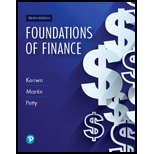
a)
To determine: Required ratios.
a)
Explanation of Solution
Calculation of current ratio:
Hence, current ratio is 2.5
Calculation of Acid-test ratio:
Hence, acid-test ratio is 1.38
Calculation of times interest earned:
Hence, times interest earned is 8.33
Calculation of inventory turnover:
Hence, inventory turnover 3.11
Calculation of total assets turnover:
Hence, total assets turnover is 1.36
Calculation of operating profit margin:
Hence, operating profit margin is 11.1%
Calculation of days in receivables:
Hence, collection period is 48.67 days
Calculation of operating return on assets:
Hence, operating return on assets is 15.15%
Calculation of debt ratio:
Hence, debt ratio is 36.4%
Calculation of return on equity:
Hence, return on equity is 16.57%
Calculation of fixed assets turnover:
Hence, fixed assets turnover is 3.46
b)
1)
To discuss: Liquidity of the firm.
b)
1)
Explanation of Solution
Company A, is certainly less liquid than industry’s average company. Both the current ratio and the acid test ratio are lower, suggesting that Company A has less liquid assets than the market in comparison to the maturing commitments of the company (current liabilities).
In fact, both the receivable accounts and the inventory move more slowly through the working capital process than is true for the industry’s typical company.
b)
2)
To discuss: Whether company managers are generating attractive operating profits on its assets.
b)
2)
Explanation of Solution
In terms of generating returns on the company’s assets, management performs better than the industry 15.2% operating
Company A 11.1% against the industry 8%, thus, the company keeps its costs and expenses lower per sales dollar. On the other hand, as shown by the lower total asset turnover, Company A is less effective in controlling its assets.
b)
3)
To discuss: Ways should the firm financing its assets.
b)
3)
Explanation of Solution
The company uses significantly more leverage than the industry’s average company, indicating a little more financial risk to Company A, but higher equity returns than normal.
Two factors affect the interest rate obtained ratio,
- 1) The operating profit level and,
- 2) The debt level.
Company A has a higher return on assets which raises the interest rate earned, but requires more debt, resulting in higher interest costs and a lower interest rate earned ratio.
Company A’s case, the net results is a higher rate of interest earned, that is, the higher operating return on assets increases the time interest earned more than the higher amount of debt decreases it.
b)
4)
To discuss: Whether managers generating the good returns on equity.
b)
4)
Explanation of Solution
Company A delivers higher equity returns than the industry, resulting from 1) a higher operating return on assets, and 2) a higher amount of debt financing.
Want to see more full solutions like this?
Chapter 4 Solutions
FOUNDATIONS OF FINANCE-MYFINANCELAB
 EBK CONTEMPORARY FINANCIAL MANAGEMENTFinanceISBN:9781337514835Author:MOYERPublisher:CENGAGE LEARNING - CONSIGNMENT
EBK CONTEMPORARY FINANCIAL MANAGEMENTFinanceISBN:9781337514835Author:MOYERPublisher:CENGAGE LEARNING - CONSIGNMENT Intermediate Financial Management (MindTap Course...FinanceISBN:9781337395083Author:Eugene F. Brigham, Phillip R. DavesPublisher:Cengage Learning
Intermediate Financial Management (MindTap Course...FinanceISBN:9781337395083Author:Eugene F. Brigham, Phillip R. DavesPublisher:Cengage Learning Cornerstones of Financial AccountingAccountingISBN:9781337690881Author:Jay Rich, Jeff JonesPublisher:Cengage Learning
Cornerstones of Financial AccountingAccountingISBN:9781337690881Author:Jay Rich, Jeff JonesPublisher:Cengage Learning Financial And Managerial AccountingAccountingISBN:9781337902663Author:WARREN, Carl S.Publisher:Cengage Learning,
Financial And Managerial AccountingAccountingISBN:9781337902663Author:WARREN, Carl S.Publisher:Cengage Learning,




